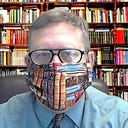Member-only story
Civic Friendship and Social Distancing: We Make Society More Just When We Stay Home and Wash Our Hands
For much of the last week I have been in rooms with a dozen other university administrators trying to decide what to do about the Coronavirus. The questions were huge and potentially devastating: should we cancel classes? Should we ask employees to work from home? Should we allow students to remain on campus? Should we bring back our students studying abroad? Each decision had a major imact on people’s lives.
In the end, we did all of these things, as did many other colleges and universities, and we did them without dissent. Our course was clear, if not convenient, and we were guided by two overlapping considerations.
More than anything else, we were guided by our obligation to keep our students and our employees safe. This goes to the core of our mission and our purpose as an institution of higher education. But we were also guided by the knowledge that we were in the midst of a once-in-a-generation public health crisis and that, if we did our part — and other institutions and individuals did theirs — we would help to “flatten the curve.” We couldnt’t do it alone; but we wanted to be part of everybody doing it together.
While participating in these discussions, I often found myself musing on a 2,500-year -old concept…
